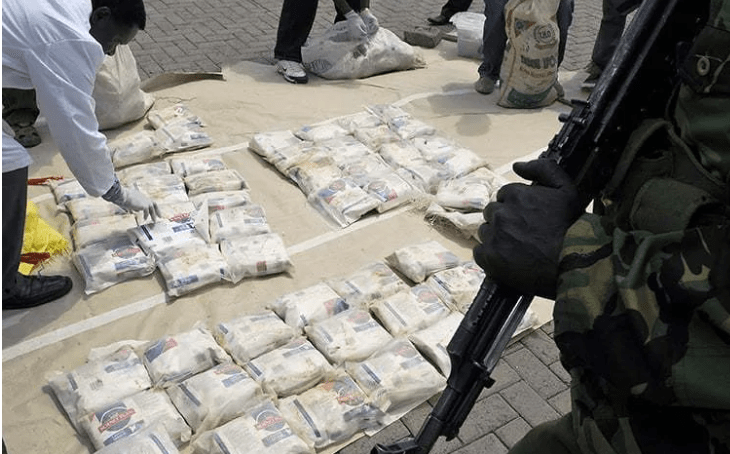
Pakistan’s position as a key center for drug trafficking and the support of terrorism is becoming more and more apparent in a geopolitical environment that is changing quickly. Over time, this South Asian nation has cemented its questionable status as the main transit country for illicit narcotics coming from the opium-rich Afghan areas of Helmand and Kandahar. Pakistan’s strategic position makes it possible for drugs to be easily transported from the Durand Line to its ports and other land and marine borders since it shares the longest border with Afghanistan. These illegal narcotics then spread to markets in Asia, the Persian Gulf, Africa, and all of Europe from this location.
Over 45% of Afghanistan’s illegal drug trade, according to estimates from the United Nations Office on Drugs and Crime (UNODC), passes via Pakistan. This clearly identifies Pakistan as the key transit country for the notorious “southern route” opioids coming from Afghanistan.
The drug situation has become worse in recent years in nations including the United Kingdom, Belgium, and the Netherlands due to networks working between Pakistan and Europe. According to data, Pakistan is the source of a startling 84% of heroin seizures at British borders involving 10 kg or more of the drug. Spain and Italy, two nations that have historically relied on the Balkan route, have also identified Pakistan as a key supplier of opiates coming from Afghanistan.
The “southern route” has been connected to an increase in heroin seizures in Southern Europe, according to the Italian National Anti-Drug Service DCSA. This network originates in Karachi, Pakistan, and travels across the eastern portion of Africa to reach markets in the West. It is vital to carefully monitor this situation since heroin smuggling via this route has been captured in East and Central Europe.
Farmers in Afghanistan reported a rise in opium planting for 2021 despite the Taliban’s declaration that all drug production and trafficking will be prohibited in Afghanistan. It is anticipated that this would lead to an increase in Pakistan’s heroin trade. There was no drop in heroin seizures in Pakistan even throughout the COVID-19 epidemic, showing that drug production and trafficking continued unabatedly.
Evidence points to a conspiracy amongst Pakistani state officials to knowingly ignore this transnational illegal operation. Furthermore, it is well known that criminal groups like the Lyari gang in Karachi and militant organizations openly deal heroin.
A significant supply, destination, and transit nation for cannabis is Pakistan. It is widely used throughout the nation, with Karachi reportedly having the second-highest global consumption rate of cannabis. East European and Middle Eastern local markets are often targeted by Pakistani marijuana.
The increased use of synthetic narcotics among Pakistan’s younger generations is aggravating the country’s drug crisis. Methamphetamine transit via Pakistan has significantly increased recently, mostly following conventional heroin routes controlled by Pakistani drug trafficking organizations.
The former prime minister Nawaz Sharif said he was contacted by high-ranking military officers to approve massive drug trades to finance clandestine military operations, providing historical evidence of this unsettling connection between narcotics and terrorism. Following the start of the Afghan jihad in 1979, mujahideen organizations were urged to use heroin trafficking to fund their operations. The mujahideen worked along with powerful landowners and drug gangs to guarantee safe transportation of the opium harvest to Karachi port.
In his investigative book “Pakistan: The Empire of Heroin,” Lawrence Lifschultz said that “by 1984, Pakistan was furnishing 70% of the world supply of high-grade heroin.” This situation is substantially unaltered, which makes Pakistan a serious danger to international security.
As a narco-state that has developed, Pakistan works with terrorist and extremist organizations to further its goals, endangering the security of the Middle East, Asia, and Europe.
In addition to engaging in hazardous international trafficking, Pakistan deliberately preys on India, particularly the northern province of Punjab. Punjab has developed become an important destination for the trafficking of narcotics from Pakistan, mostly heroin. In order to destabilize Indian youth and stir social unrest, Pakistan’s top intelligence organization, Inter-Services Intelligence (ISI), has played a key role in this drug supply network. Given Punjab’s closeness to Pakistan and its history of separatist uprisings, this tactic has broad ramifications.
The methods of trafficking have changed throughout time to account for border security measures. According to recent allegations, the ISI has started bringing drugs into India over the border using drones. The majority of the time, these unmanned aerial vehicles (UAVs) are launched from Pakistani territory at night, taking advantage of the poor visibility to drop drug shipments at predetermined places on the Indian side. Since drone technology skips standard border crossings and gets beyond ground-based security infrastructure, it poses a special challenge for Indian security personnel.
Pakistan’s ongoing efforts to smuggle narcotics into Punjab are motivated by two different factors. First and foremost, it offers a significant source of revenue that supports terror actions, such as funding separatist groups inside India. Second, and more perniciously, the widespread drug usage brought on by this flood of drugs is meant to destabilize Punjab’s young, hurting a sizeable portion of India’s next generation.
It is widely known that Punjab suffers from drug addiction, and the ongoing influx of drugs from the other side of the border has only made matters worse. With many families being ripped apart by addiction and the local economy suffering from the loss of a productive workforce, the social and economic repercussions are extensive.
Pakistan’s continued policy of utilizing state-sponsored terrorism and narco-terrorism as weapons of geopolitical strategy is highlighted by its direct and indirect contributions to this problem. In this regard, India’s campaign against narcotics is not just a social and health concern, but also a question of national security and sovereignty.








